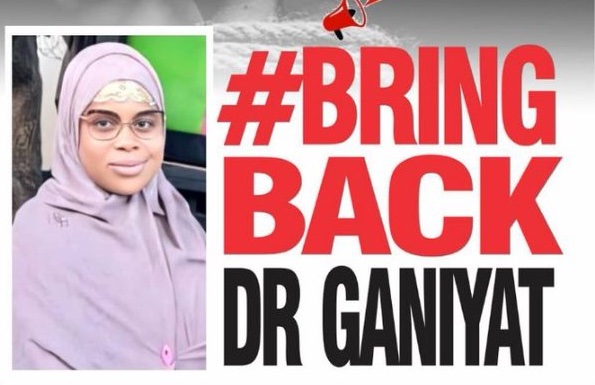Olayomi Koiki

KADUNA, Nigeria – A doctor was released by gunmen after spending almost a year in the kidnappers’ den, local news outlets reported.
Ganiyat Popoola, a registrar in the department of ophthalmology at the National Eye Centre in the northwestern state of Kaduna was abducted on December 27, 2023 alongside her husband and nephew, at the senior staff quarters of the eye centre.
While her husband was released in March, following discussions with the abductors, Popoola and her nephew remained in captivity, with the Nigerian Association of Resident Doctors (NARD) embarking on a nationwide warning strike in August to demand their freedom.
However, NARD spokesperson Omoha Amobi announced in a Thursday statement that the doctor has regained freedom.
KOIKI Media understands that Popoola’s nephew has also been released.
“The president, Nigerian Association Of Resident Doctors (NARD ) Dr. Osundara Tope Zenith is filled with immense joy and relief to inform you that Dr. Ganiyat Popoola, our dear colleague and resident doctor from national eye centre Kaduna, who was kidnapped and remained in captivity for more than ten months, has been released and reunited with her family,” NARD’S statement reads.
“We extend our heartfelt gratitude to everyone who played a role in ensuring her safe return.
“The unwavering support, prayers, and contributions of all members and well-wishers have been invaluable in this challenging time.
“Let us continue to support one another as we work towards a safer and more secure environment for all.”
– Insecurity and violence in Nigeria –
For more than a decade, civilians in Nigeria have faced multiple security threats and risk of atrocities as result of attacks, kidnappings and extortion by various non-state armed groups.
Since the start of 2024 civilians have faced intensified violence across Nigeria, and near-daily attacks by armed groups resulting in kidnappings and other abuses against civilians.
Armed groups and gangs, including so-called “bandits,” have – for many years – perpetrated widespread atrocities, including murder, rape, kidnapping, organized cattle-rustling and plunder. Armed herdsmen are also destroying vast swaths of farmland, prompting many farmers to abandon their land out of fear of attack.
In August, the Director General of the World Trade Organisation (WTO), Ngozi Okonjo-Iweala, said insecurity in Nigeria is weaponised by politicians for political and selfish reasons.
A Nigerian soldier, Suleiman S., also alleged that the government’s practice of paying ransoms to terrorists – dubbed as bandits in the country was hindering the military’s ability to effectively combat them.
He urged the public to redirect their blame from the Nigerian Army to the government, emphasising that soldiers are constrained by orders and cannot take independent action.
The soldier said the military has the capability to eradicate bandits, particularly in hotspots like Zamfara State forest within a week if given the necessary orders.
He expressed frustration that the military’s potential is being wasted due to a lack of direction from leadership, whom he accused of profiting from the ongoing crisis.
Nigerian authorities are not going to arrest Boko Haram terrorists, bandits, and other criminals because they were created for political purposes, human rights activist Omoyele Sowore had alleged in September.
Speaking when he appeared on Voice of The People FM, Sowore alleged that government officials have links with the criminals, using them to gain power and later protecting them.
